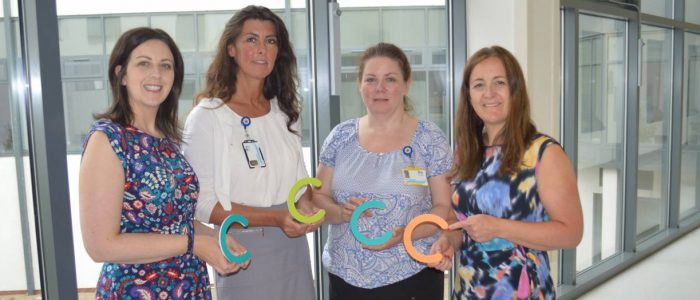World Cancer Day – Scotland’s Drive To Turn The Big C into the “wee c”
NHS Forth Valley helping bring cancer down to size
NHS Forth Valley today (04 February 2016) highlighted the ways in which it is helping turn Scotland’s Big C into the wee c as it marked World Cancer Day.
Six months after the wee c was launched by the Scottish Government, in partnership with Cancer Research UK , the health board has reflected on the strides taken in Scotland in this short time to bring cancer down to size.
The wee c aims to change the way cancer is viewed in Scotland, in a bid to reduce fear around the disease and boost survival rates.
Thanks to earlier detection, research breakthroughs and treatment advances, more people are surviving than ever before. It’s hoped that more people will present with potential signs and symptoms sooner rather than later, and attend screening when invited as they learn that cancer isn’t what it used to be.
To coincide with World Cancer Day, NHS Forth Valley highlighted the contribution it’s made to Scotland’s drive to increase survival rates, and its work to raise awareness of the importance of finding cancer early.
This included its health promotion team delivering bowel cancer training across Forth Valley, resulting in increased knowledge and awareness of the signs and symptoms of bowel cancer and the importance of seeking help early. Participants also stated they were more likely to do the bowel screening test.
All of those who attended the training sessions also stated they would discuss bowel cancer with family and friends of all age groups.
Since August 2015, further positive developments have been made across Scotland, including:
– The opening of the £22million Lanarkshire Beatson, Scotland’s newest radiotherapy satellite centre, in November 2015
– Investment secured to bring Scotland’s first Robotic-Assisted Surgical System to the Aberdeen Royal Infirmary, which will initially be used to treat prostate cancer
– £450,000 of funding committed by the Scottish Government and Breast Cancer Now to support Scottish-led breast cancer research in January 2016
– Eight new project awards and fellowships across Scotland supported by Cancer Research UK to enable ground-breaking research into a wide range of cancer types and treatments
– Latest statistics showing half a million people in Scotland are returning their bowel screening test every year – the most ever – with 58.1 per cent uptake in NHS Forth Valley amongst those eligible1
– Forming of the National Cancer Clinical Services Group, to drive improvements in cancer care
– The Innovative Healthcare Delivery Programme (IHDP) established to improve outcomes through enhanced cancer intelligence for clinicians and patients
In addition, Scotland’s Cancer Strategy, and results from the country’s first Cancer Patient Experience survey, will be published this year.
NHS Forth Valley Medical Director Miss Tracey Gillies said:
“We’re proud to be contributing to Scotland’s wee c vision, with our clinicians, researchers, nurses, screening teams, porters and many more working every day to help bring cancer down to size.
“Everyone has a role to play in improving our cancer survival rates. Remember that the sooner cancer is found, the easier it is to treat so, if you notice any persistent or unusual changes, see your doctor sooner rather than later.”
The average ten year survival rate for cancer has doubled over the past 30 years – now two in four people survive, compared to one in four in the 1970s, and today half of men and women in Scotland survive cancer (48 per cent of males, and 54 per cent of females) 2.
Shona Robison, Cabinet Secretary for Health, Wellbeing and Sport, said:
“Thanks to innovation and investment, there are around 176,000 people in Scotland who have been diagnosed with cancer over the last 20 years and who are still alive – over double the population of Inverness.
“Reframing the way cancer is viewed goes hand-in-hand with boosting survival rates and everyone can play a part. If we can raise awareness of what is being done to tackle cancer, we’ll hopefully, in time, be able to address the fear people have in seeing their GP or attending their screening appointment. The earlier you come forward to get checked or screened, the better, it could save your life.”





